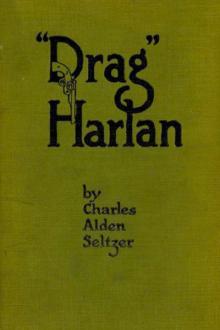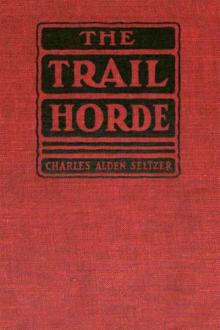'Drag' Harlan, Charles Alden Seltzer [ebook reader computer TXT] 📗

- Author: Charles Alden Seltzer
- Performer: -
Book online «'Drag' Harlan, Charles Alden Seltzer [ebook reader computer TXT] 📗». Author Charles Alden Seltzer
However, he had not taken the chain from her hand.
“Is it yours?” she asked.
“Yes—mine,” he answered, hesitatingly. “Where did you find it?”
“Mr. Harlan found it.” Barbara noted Haydon’s quick start, the searching glance he gave Harlan—who was now leaning on a rail of the corral fence, seemingly uninterested.
Haydon laughed, a little hoarsely, it seemed to Barbara, and more loudly than the occasion seemed to demand. She thought, though, that the laugh might have been a jeer for Harlan’s action in turning the chain over to her instead of returning it directly to the owner.
She did not catch the searching inquiry of Haydon’s glance at Harlan, nor did she see Harlan’s odd smile at Haydon, and the slow wink that accompanied it.
But the wink and the smile conveyed to Haydon the intelligence that Harlan knew the story connected with the loss of the chain, and that he had not communicated it to the girl. They also expressed to Haydon the message that Harlan and Haydon were kindred souls—the smile and the wink told Haydon that this man who knew his secret was secretly applauding him, even while inwardly laughing at him for his fear that the secret would be betrayed.
Harlan’s voice broke a short silence.
“Found it right about here—the other day. It must have laid there a long time, for it took a heap of polishin’ to brighten it up.” Again he closed an eye at Haydon, and the latter grinned broadly.
Barbara silently endured a pang of disappointment. She had caught Harlan’s wink. The man had betrayed jealousy only a few minutes ago, and he had refused personally to return the chain to Haydon. And yet he stood there now, smiling and winking at the other, evidently with the desire to ingratiate himself. Sycophant, weakling, or fool—which was he? She shuddered with disgust, deliberately turned her back to Harlan, and began to walk toward the ranchhouse, Haydon following.
And Harlan, standing at the fence, leaned an elbow on one of the rails and watched the two, an enigmatic smile on his face.
For he had succeeded in opening a gate which disclosed a trail that would lead him straight to the mystery, a breath of which had been borne to him that morning upon the slight breeze that had swept down to him from the mighty valley out of which Haydon had ridden.
Between him and Haydon a bond had been established, fashioned from the links of the section of chain.
Upon the morning of the fourth day following Haydon’s visit to the Rancho Seco, a dust cloud developed on the northwestern horizon. Harlan observed the cloud; he had been watching for it since dawn, when he had emerged from the stable door, where he had been looking after Purgatory.
From the ranchhouse Barbara also saw the cloud, and she ran upstairs to one of the north windows. There, with her face pressed against the glass, she watched the cloud grow in size, observed that it was dotted with the forms of horsemen; saw at last that the horsemen were headed straight for the Rancho Seco. Then, wondering, anxious, eager, she descended the stairs and ran out to where Harlan was standing, speaking breathlessly:
“What does it mean? Who are they?”
“It’ll be Red Linton an’ some T Down boys.”
“‘T Down’?”
“Pardo men. From where I used to work. I sent Linton for them. If I’m going to run a ranch I aim to run it with men I can depend on.”
She had hardly spoken to him in the four days that had elapsed since Haydon’s last visit, for the disgust she had felt that day had endured. But there was something new in his manner now—a briskness, a business-like air that made her look sharply at him.
He smiled at her, and in the smile was a snapping humor that puzzled her.
She stood, watching for a while—until the group of horsemen became clearly defined—and then, with a sudden fear that the men might be outlaws of the same type as Harlan—possibly he had sent for them because they were—she returned to the ranchhouse and watched from one of the windows.
When the T Down men rode up to the corral gate they dismounted and surrounded Harlan. There were ten of them—rugged-looking fellows of various ages, bepistoled, begrimed with dust, and articulate with profane expressions of delight.
“Hell’s a-poppin’, Red says!” yelled one. “He says there’s geezers here which is pinin’ for yore gore. Turn me loose on ’em—oh, turn me loose!”
The men, tired, dusty, and hungry, swarmed into one of the bunkhouses immediately after they had turned their horses into the corral and cared for their saddles.
The men were in good spirits, despite their long ride; and for half an hour after they descended upon the bunkhouse the air pulsed with their talk and their laughter, as they washed their dust-stained faces from the tin washbasin on the bench outside the door, and combed their hair with a comb attached to a rawhide thong that swung from the wall above the basin.
They had been informed by Red Linton regarding the situation that had developed at the Rancho Seco—fully informed before they had begun their trip westward—Linton scrupulously and faithfully presenting to them the dangers that confronted them. And though some of them were still curious, and sought a word with Harlan in confirmation, they seemed to be satisfied to trust to Harlan’s judgment. Their faith was of the kind that needs but little verbal reassurance.
That they admired the man who had sent for them there was little doubt; for they watched him with glowing eyes as he talked with them, revealing their pride that they had been selected. Hardy, clear-eyed, serenely unafraid, they instantly adapted themselves to the new “job,” and before their first meal was finished they were thoroughly at home.
Shortly afterward—while the men were lounging about inside—Harlan drew Linton outside.
“That’s the bunch I would have picked if I had gone myself,” complimented Harlan. “I’m thankin’ you a heap.”
He whispered to Linton the story of Haydon’s last visit and for the first time Linton heard about the section of chain which convicted Haydon of the murder of Lane Morgan. Linton’s eyes gleamed.
“I’ve always sort of suspected the son-of-a-gun!” he declared. “An’ him makin’ love to Barbara! The sneakin’ coyote! An’ so you’re goin’ to see him? I’d be a whole lot careful.”
Harlan’s smile was grave. “I’m reckonin’ to be. I’d have gone before this, but I was waitin’ for you boys. Nobody is sayin’ anything to anybody. You’re stickin’ close to the Rancho Seco, not lettin’ Barbara out of your sight. That’s what I wanted you an’ the other guys for. I’m playin’ the rest of it a lone hand.”
Leaving Linton standing near the bunkhouse, he went to the stable, where he threw saddle and bridle on Purgatory. Then he mounted, waved a hand at Linton, who was watching him, and rode to the ranchhouse. At the northwest corner—around which Haydon had ridden on the occasion of his last visit—he brought Purgatory to a halt, for he saw Barbara just emerging from the patio gate.
She halted in the opening when she observed him; making a picture that was vivid in his memory for many days afterward—for her eyes were alight with wonder, her cheeks were flushed, and she was breathing fast.
For she had watched from a window the coming of the T Down men; she had noted the conference between Harlan and Linton; and she had seen Harlan waving a hand at the red-haired man, seemingly in farewell. She stood now, afflicted with a strange regret, suddenly aware that she would feel the absence of the man who sat on his horse before her—for she divined that he was going.
“I’m sayin’ so-long to you, ma’am,” smiled Harlan.
“Oh!” she said, aware of the flatness of her tone. “Are you going away?”
“I’m figurin’ to go. I ain’t used to hangin’ around one place very long. But I’m comin’ back some day. Red Linton an’ the boys will be seein’ that things go smooth with you. You can depend on Red, and all the boys. They’re Simon-pure, dyed-in-the-wool, eighteen-carat men.” And now he grinned, gravely. “Remember this, Barbara: A man will do things when he’s handlin’ a gold chain—things that he wouldn’t do if there didn’t happen to be any chain.”
He doffed his hat and slapped Purgatory sharply, heading the animal westward, toward the yawning mouth of the big basin that stretched its mighty length into the mystery of distance.
But his words left her with a conviction that she had again misjudged him, and that when he had appeared to fawn on Haydon he had been merely acting, merely pretending. She watched him, regretfully, longingly, assailed by emotions that she could not understand—until he and Purgatory grew small in the gulf of distance; until horse and rider were swallowed in the glowing haze.
At the edge of the big level, where it merged into the floor of the basin, Harlan drew Purgatory to a halt. For an instant he sat in the saddle scrutinizing a section of buffalo grass that fringed a clump of willows near the almost dry bed of the river that doubled slightly as it came from the basin. Something in the appearance of the grass had attracted his attention—it was matted, as though something had lain or rolled in it.
He rode closer, cautiously, for the little trees formed a covert behind which any one of several dangers might lie concealed—and looked down at the grass. As he examined the place his lips twisted into a grim smile, and his eyes grew bright with comprehension.
He rode around the clump of trees, making sure it was not occupied; then he dismounted.
Someone had been concealed in the covert for many days—a man. For he saw the imprints of heels, and indentations where spurs had gashed the earth. The marks were all fresh—recently made. While he watched he saw some blades of the long grass slowly rise—as though, relieved from some pressure that had been upon them, they were eager to regain an upright position. He also saw scraps of food—jerked beef and biscuit—scattered here and there.
He frowned, convinced that for days a man had occupied the covert, watching the Rancho Seco; convinced also, that the mystery he had sensed some days ago had been man-made, as he had felt. The man who had been there had been a sentinel, a spy, sent by Deveny or Haydon to observe his movements, and to report them, of course, to one or the other of the two outlaws.
Harlan remounted Purgatory. His caution had not been wasted, and his vigilance in guarding the ranchhouse must have been irritating to the man who had been watching.
He urged Purgatory on again—heading him westward, as before. And when he reached the crest of a slight rise in the valley—from where he could see the trail as it twisted and undulated around hills and into depressions—he saw, far up the valley—and yet not so far, either—not more than two miles—a horseman, riding slowly—away from him.
The horseman was the spy, of course. Harlan had no doubt that if he lingered in the vicinity of the covert long enough he would discover the place where the horse had been concealed. But that was not important, now that he had discovered enough to satisfy himself that there had been a spy—and so he rode on, smiling faintly, knowing that the rider was headed into the valley—possibly to the outlaw rendezvous to appraise Deveny and the others





Comments (0)